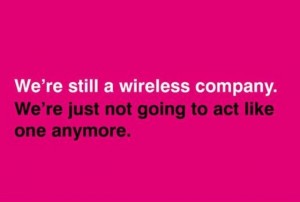‘Un-carrier’ Wars
Ajit Deshpande - January 14, 2014 - 0 Comments
 Last week saw a couple of interesting announcements from T-Mobile, pertaining to the US carrier ecosystem. First, T-Mobile announced its preliminary Q4’13 quarterly results last week, which showed the carrier had added a staggering 1.6 million net new subscribers during Q4’13. Net new subscribers added over all of 2013 were 4.4 million. T-Mobile’s total year-end post-paid and pre-paid subscriber base for 2013 was just more than 37 million. Second, T-Mobile also announced that it would offer up to $650 in credits to folks that switched from other carriers to its own services (up to $350 in early termination fees for contract breakage + up to $300 in credit for trading in the user’s old phone).
Last week saw a couple of interesting announcements from T-Mobile, pertaining to the US carrier ecosystem. First, T-Mobile announced its preliminary Q4’13 quarterly results last week, which showed the carrier had added a staggering 1.6 million net new subscribers during Q4’13. Net new subscribers added over all of 2013 were 4.4 million. T-Mobile’s total year-end post-paid and pre-paid subscriber base for 2013 was just more than 37 million. Second, T-Mobile also announced that it would offer up to $650 in credits to folks that switched from other carriers to its own services (up to $350 in early termination fees for contract breakage + up to $300 in credit for trading in the user’s old phone).
Over the past year or so, T-Mobile has used some interesting tactics in trying to gain net new subscribers. In Q3’13, the company had announced that it would provide its services without a contract (but with still a pseudo-contract in the form of the user paying the cost of the subsidized phone over a two year period). While the other carriers have responded in kind to these tactics, clearly T-Mobile has succeeded so far. But how sustainable is this success for T-Mobile? T-Mobile currently lags the other three major carriers in wireless infrastructure build-out, spectrum capacity and cash-assets, which intuitively seem to together represent a vicious cycle that might result in increased customer churn and net subscriber losses in the medium term. On the flip side, maybe for a number of urban markets, T-Mobile’s coverage is ‘good enough’, in which case the company might see continued net new subscriber addition due to its seeming consumer-friendliness. Which of these two possibilities get realized will determine whether T-Mobile emerges stronger over the next year or so, or whether its performance relapses into mediocrity.
On a broader note, these un-carrier wars will likely bring other aspects into the spotlight: Should smartphones (iPhones included) really cost $600 each to the end-user? Is there really space for four major carriers in today’s capital-intensive wireless environment? Can small-cells and WiFi hotspots and WiFi calling help disrupt the carrier tiered-pricing model? Clearly, T-Mobile is stirring the pot, so we are in for interesting times ahead!